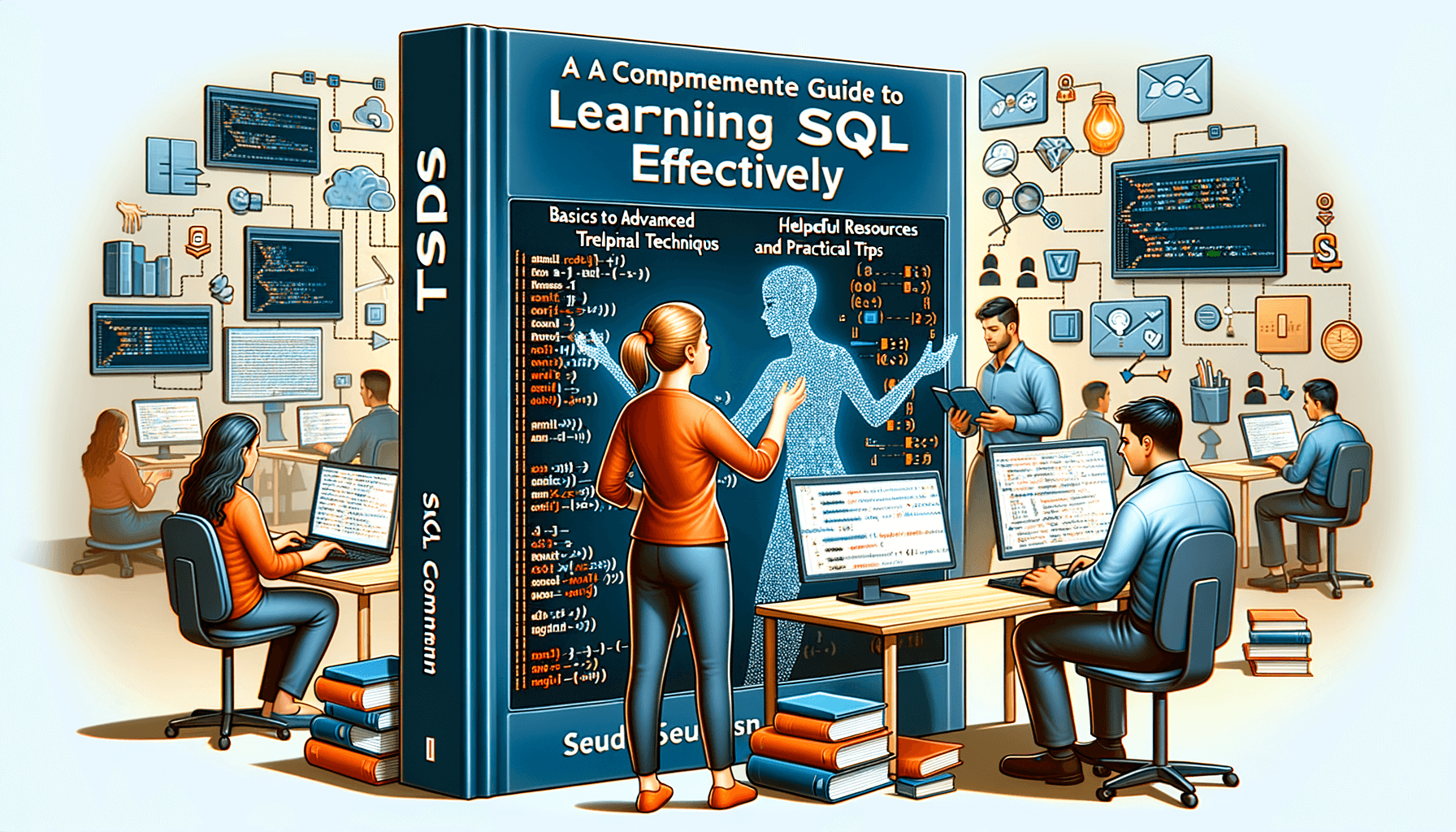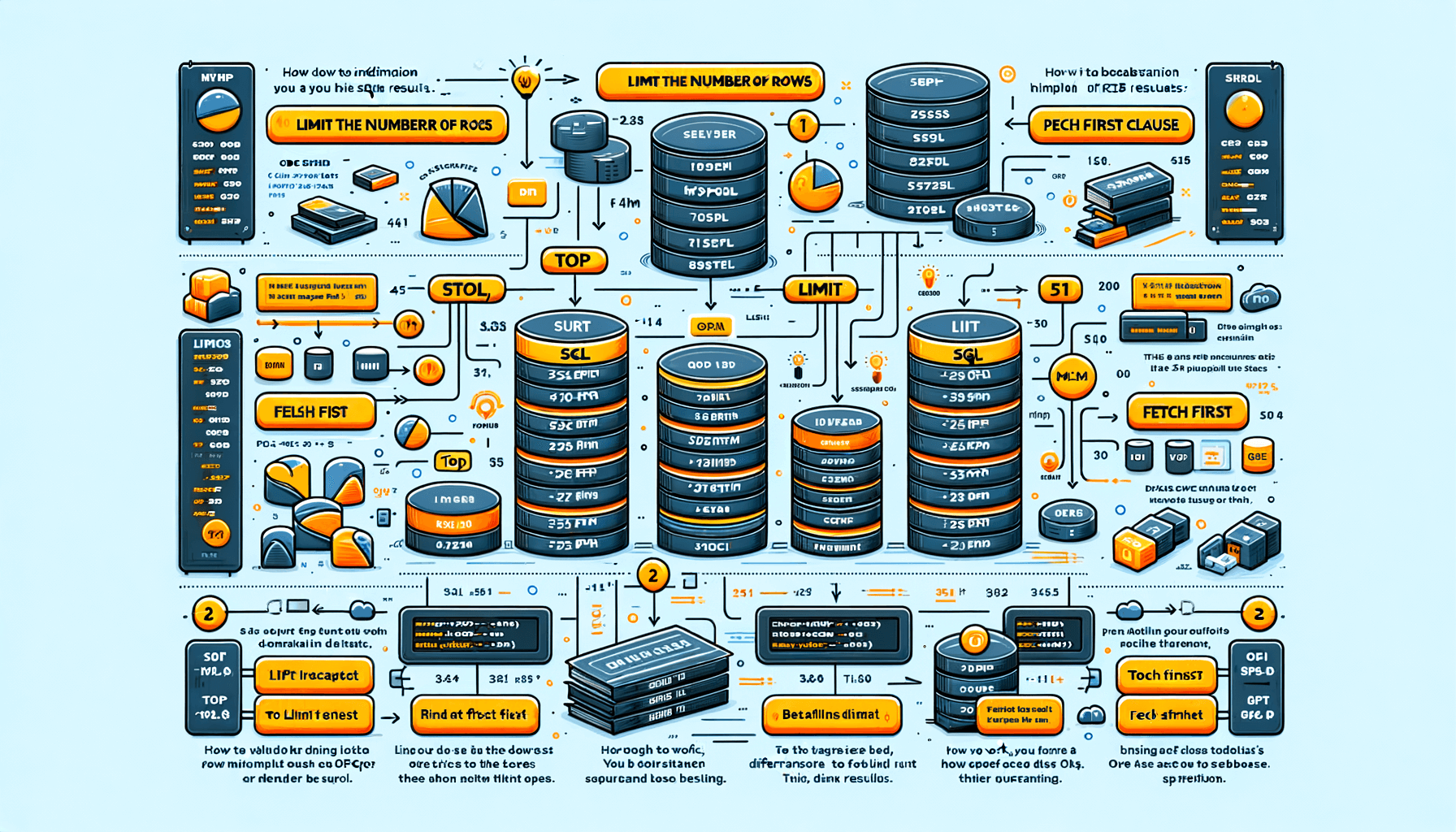A big variety of articles and resources

What is the best way to learn SQL effectively and efficiently?
 Sia Author and Instructor
Learn SQL
Sia Author and Instructor
Learn SQL
13 minute read
Learning SQL can seem tough, but it's a skill that can open many doors in the tech world. Whether you're a beginner or looking to sharpen your skills, finding the best way to learn SQL is key to becoming efficient and effective.
Key Takeaways
- Start with the basics to build a strong foundation.
- Choose the right learning resources like books, online courses, and practice platforms.
- Apply your skills through real-world projects and problem-solving.
- Stay updated with the latest SQL features and industry best practices.
- Avoid common mistakes like overcomplicating queries and ignoring performance issues.
Understanding the Basics of SQL
Introduction to Databases
To start with SQL, we need to understand what databases are. Databases are organized collections of data that can be easily accessed, managed, and updated. They are essential for storing information in a structured way, making it easier to retrieve and manipulate data when needed.
Key SQL Concepts
SQL, or Structured Query Language, is the standard language used to communicate with databases. It allows us to perform various operations such as querying data, updating records, and managing database structures. Mastering SQL is crucial for anyone looking to work with data, as it forms the backbone of data management and analysis.
Importance of SQL in Data Management
SQL plays a vital role in data management. It enables us to handle large volumes of data efficiently and ensures data integrity and security. By learning SQL, we can effectively manage and analyze data, which is essential for making informed decisions in any data-driven field.
Understanding the basics of SQL is the first step towards becoming proficient in data management. It lays the foundation for more advanced techniques and applications in the world of databases.
Choosing the Right Learning Resources
When starting with SQL, selecting the right books and online courses is crucial. Books provide in-depth knowledge and can be a great reference. Online courses, on the other hand, offer structured learning paths and often include video tutorials, quizzes, and assignments to reinforce learning.
Interactive tutorials and practice platforms are excellent for hands-on learning. Websites like Codecademy and Khan Academy offer interactive coding environments where you can write and execute SQL queries directly in your browser. This immediate feedback helps in understanding and retaining concepts better.
Engaging with the SQL community and participating in forums can significantly enhance your learning experience. Platforms like Stack Overflow and Reddit have active communities where you can ask questions, share knowledge, and learn from others' experiences. Being part of a community helps in staying motivated and updated with the latest trends and best practices in SQL.
Building a Strong Foundation
Learning Basic SQL Commands
To start, we need to get comfortable with basic SQL commands. These commands are the building blocks of any SQL query. Mastering these basics will make it easier to tackle more complex queries later on. Commands like SELECT, INSERT, UPDATE, and DELETE are essential for interacting with databases.
Understanding Data Types and Structures
Next, it's crucial to understand the different data types and structures used in SQL. Knowing whether to use an INT, VARCHAR, or DATE can significantly impact the efficiency of your database. This knowledge helps in designing tables that are both efficient and easy to query.
Practicing with Simple Queries
Finally, practice is key. Start with simple queries to reinforce your understanding. Write queries to retrieve data, filter results, and sort information. The more you practice, the more intuitive writing SQL will become.
Building a strong foundation in SQL is like learning the alphabet before writing essays. It sets the stage for everything else you'll do in data management.
Advanced SQL Techniques
Complex Queries and Subqueries
In this section, we delve into the art of crafting complex queries and subqueries. These are essential for extracting detailed information from large datasets. Mastering these techniques allows us to handle intricate data retrieval tasks efficiently. We often encounter scenarios where a single query isn't enough, and subqueries become our go-to solution.
Using Joins Effectively
Joins are fundamental in SQL for combining data from multiple tables. Understanding how to use INNER JOIN, LEFT JOIN, and RIGHT JOIN effectively can significantly enhance our data manipulation capabilities. By mastering joins, we ensure data integrity and optimize query performance, making our database operations more robust.
Advanced Functions and Procedures
Advanced SQL functions and procedures, such as COUNT, DISTINCT, and ROUND, are powerful tools for data analysis. These functions help us perform complex calculations and data transformations with ease. Additionally, writing stored procedures can automate repetitive tasks, saving time and reducing errors.
Engaging in a mini course: SQL query expansion - master SQL techniques for database management, leadership, and challenge-based learning. Gain practical experience and expert-led training for career advancement.
Practical Application of SQL Skills
Real-World Problem Solving
To truly master SQL, we need to apply our knowledge to real-world problems. This involves working with actual datasets and solving practical issues. Hands-on experience is crucial for understanding how SQL functions in a real environment. By tackling real-world scenarios, we can enhance our problem-solving skills and gain a deeper understanding of SQL's capabilities.
Project-Based Learning
Engaging in project-based learning allows us to apply SQL in various contexts. Projects can range from simple database management tasks to complex data analysis. This method not only reinforces our learning but also helps us build a portfolio of work that demonstrates our skills. By working on projects, we can see how SQL is used in different industries and applications.
Internships and Job Experience
Gaining practical experience through internships or job placements is invaluable. These opportunities allow us to work alongside experienced professionals and learn industry best practices. Internships provide a platform to apply our SQL skills in a professional setting, giving us a competitive edge in the job market. Additionally, real-world experience helps us understand the nuances of SQL that are not always covered in textbooks or courses.
Practical skills enhancement is key to gaining a competitive edge in business intelligence. By applying our knowledge through targeted exercises and real-world scenarios, we can significantly improve our SQL capabilities.
Optimizing SQL Performance
Indexing and Query Optimization
To make our SQL queries run faster, we need to use indexing. Indexes help the database find data quickly without scanning every row. Proper indexing can make a huge difference in performance. We should also write our queries in a way that the database can execute them efficiently. This means avoiding unnecessary columns in SELECT statements and using WHERE clauses to filter data early.
Database Normalization
Normalization is about organizing our database to reduce redundancy. By breaking down tables into smaller, related tables, we can ensure that each piece of data is stored only once. This not only saves space but also makes our queries faster and more reliable. However, we need to balance normalization with performance needs, as too many joins can slow down queries.
Performance Tuning Techniques
There are several techniques we can use to tune the performance of our SQL databases. These include:
- Query optimization: Writing efficient queries that minimize resource usage.
- Index management: Regularly updating and maintaining indexes to ensure they are effective.
- Analyzing query execution plans to identify bottlenecks.
- Using caching to store frequently accessed data.
At sqlskillz.com, we offer a specialized course on performance optimization and data architecture. This course includes real-world projects that help enhance our database management skills.
By applying these techniques, we can significantly improve the performance of our SQL databases, making them faster and more efficient.
Staying Updated with SQL Trends
Latest SQL Features and Updates
To stay ahead in the field, we must keep up with the latest SQL features and updates. New versions of SQL databases often come with enhanced functionalities and performance improvements. Regularly checking official documentation and release notes can help us stay informed about these changes.
Industry Best Practices
Adopting industry best practices is crucial for maintaining efficient and secure databases. These practices include proper indexing, query optimization, and data normalization. By following these guidelines, we can ensure our databases run smoothly and effectively.
Continuous Learning and Certification
Continuous learning is essential in the ever-evolving field of SQL. Enrolling in advanced courses, attending workshops, and obtaining certifications can significantly boost our skills and knowledge. Certifications from recognized institutions validate our expertise and can open up new career opportunities.
Staying updated with SQL trends not only enhances our technical skills but also makes us more valuable in the job market. By continuously learning and adapting, we can tackle complex data challenges with confidence.
Utilizing SQL in Different Domains
Business Intelligence and Analytics
In the realm of business intelligence and analytics, SQL is indispensable. It allows us to extract and manipulate data to generate insightful reports. Mastering SQL enables us to make data-driven decisions that can significantly impact business strategies. By using SQL, we can efficiently handle large datasets and perform complex queries to uncover trends and patterns.
Web Development
SQL plays a crucial role in web development by managing the backend databases that store user information, content, and other essential data. We can use SQL to create, read, update, and delete data, ensuring that web applications run smoothly. Understanding SQL helps us build dynamic websites that can interact with databases seamlessly.
Data Engineering
For data engineers, SQL is a fundamental skill. It is used to design, implement, and maintain the architecture of data systems. SQL helps us in optimizing data pipelines, ensuring data integrity, and performing ETL (Extract, Transform, Load) processes. By leveraging SQL, we can ensure that data flows efficiently from various sources to the final destination, ready for analysis.
Gaining practical SQL skills with hands-on projects and expert-led training is essential for mastering MySQL performance and query optimization.
Common Mistakes to Avoid
Overcomplicating Queries
When learning SQL, it's easy to fall into the trap of making queries more complex than necessary. We should aim for simplicity and clarity in our code. Overcomplicated queries can be hard to debug and maintain, leading to errors and inefficiencies.
Ignoring Performance Issues
Performance is crucial in SQL. Ignoring performance issues can lead to slow query execution and poor user experience. We must regularly optimize our queries and use indexing to enhance performance.
Lack of Proper Documentation
Proper documentation is often overlooked but is essential for maintaining and scaling SQL databases. Without clear documentation, it becomes challenging for others to understand and work with your code. Always document your queries and database structures.
Remember, mastering SQL involves not just writing queries but writing them well. Avoiding these common mistakes will help us become more proficient and efficient in SQL.
Leveraging AI and Automation in SQL Learning
In today's fast-paced world, leveraging AI and automation can significantly enhance our SQL learning experience. AI-powered tools can provide personalized learning paths, making it easier to grasp complex concepts. Automated query generation can save us time and help us focus on understanding the logic behind SQL commands.
AI-Powered Learning Tools
AI-powered learning tools are revolutionizing the way we learn SQL. These tools can adapt to our learning pace and style, offering customized lessons and exercises. For instance, platforms like sqlskillz.com offer AI micro-courses that focus on practical skills, ensuring we get hands-on experience.
Automated Query Generation
Automated query generation tools can be a game-changer for beginners. These tools can generate SQL queries based on our input, allowing us to see the correct syntax and structure. This not only helps us learn faster but also reduces the chances of making errors.
Enhancing Productivity with AI
AI can also enhance our productivity by providing real-time feedback and suggestions. This immediate feedback loop helps us correct mistakes on the spot and understand the nuances of SQL commands better. Additionally, AI can assist in optimizing queries, ensuring they run efficiently and effectively.
By integrating AI and automation into our SQL learning journey, we can achieve a deeper understanding and mastery of SQL in a shorter time frame.
Evaluating Your SQL Skills
Self-Assessment Techniques
To gauge our SQL skills, we can start with self-assessment. This involves solving various SQL problems and comparing our solutions with standard ones. Regular practice helps us identify areas where we need improvement. We can also use online platforms that offer quizzes and coding challenges to test our knowledge.
Certifications and Exams
Earning certifications is a great way to validate our SQL skills. Many organizations offer certifications that are recognized in the industry. These exams typically cover a wide range of topics, from basic queries to advanced database management. Preparing for these exams can help us solidify our understanding and boost our confidence.
Feedback from Peers and Mentors
Getting feedback from peers and mentors is invaluable. They can provide insights into our strengths and weaknesses. Participating in study groups or forums allows us to discuss problems and solutions, enhancing our learning experience. Mentors, with their industry insights, can guide us on how to apply SQL effectively in real-world scenarios.
Jumpstart SQL offers free introductory lessons with hands-on projects, personalized support, and industry insights. Learn SQL effectively for data-driven roles. Instructor Eric Vanier has 25 years of experience.
Want to see how good you are at SQL? Visit our website to test your skills and learn more. We have courses that can help you become a SQL expert. Don't wait, start your journey today!
Conclusion
Learning SQL effectively and efficiently requires a mix of structured learning and practical application. By starting with the basics and gradually moving to more complex topics, you can build a strong foundation. Engaging in hands-on projects and real-world problems will help solidify your understanding and boost your confidence. Remember, consistent practice and seeking support when needed are key to mastering SQL. With dedication and the right resources, you can become proficient in SQL and open up new opportunities in the tech field.
Frequently Asked Questions
What is SQL?
SQL stands for Structured Query Language. It's a standard language used to communicate with databases and manage data.
Why is SQL important?
SQL is essential because it allows you to interact with databases, retrieve data, and perform various operations like updates, deletions, and insertions.
How long does it take to learn SQL?
The time it takes to learn SQL varies, but with consistent practice, you can grasp the basics in a few weeks. Mastering advanced concepts may take a few months.
What are some good resources for learning SQL?
Books, online courses, interactive tutorials, and community forums are excellent resources for learning SQL. Websites like Codecademy and Khan Academy also offer great tutorials.
Do I need to know programming to learn SQL?
No, you don't need prior programming knowledge to learn SQL. It's designed to be user-friendly and is often the first step into programming and data management.
What are some common mistakes to avoid when learning SQL?
Common mistakes include overcomplicating queries, ignoring performance issues, and not documenting your work properly. Practice and review can help avoid these pitfalls.
Can I use SQL for web development?
Yes, SQL is widely used in web development for managing databases and retrieving data for websites. It's a valuable skill for web developers.
Is SQL the same for all databases?
While the core SQL syntax is standardized, different databases like MySQL, PostgreSQL, and SQL Server have their own extensions and variations. It's good to learn the specific features of the database you are using.
Related Articles

How to limit rows in SQL results
11 minute read

How to practice my SQL skills?
12 minute read

How to select a percentage of rows in SQL
8 minute read




